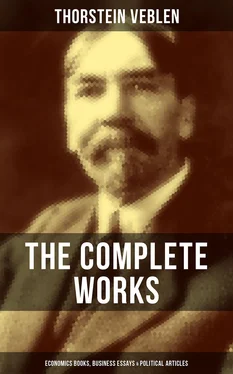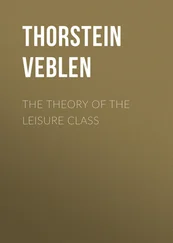In this connection it is worthy of notice that the possibility of producing pathological and other idiosyncrasies of person and manner by shrewd mimicry and a systematic drill have been turned to account in the deliberate production of a cultured class—often with a very happy effect. In this way, by the process vulgarly known as snobbery, a syncopated evolution of gentle birth and breeding is achieved in the case of a goodly number of families and lines of descent. This syncopated gentle birth gives results which, in point of serviceability as a leisure-class factor in the population, are in no wise substantially inferior to others who may have had a longer but less arduous training in the pecuniary properties.
There are, moreover, measureable degrees of conformity to the latest accredited code of the punctilios as regards decorous means and methods of consumption. Differences between one person and another in the degree of conformity to the ideal in these respects can be compared, and persons may be graded and scheduled with some accuracy and effect according to a progressive scale of manners and breeding. The award of reputability in this regard is commonly made in good faith, on the ground of conformity to accepted canons of taste in the matters concerned, and without conscious regard to the pecuniary standing or the degree of leisure practised by any given candidate for reputability; but the canons of taste according to which the award is made are constantly under the surveillance of the law of conspicuous leisure, and are indeed constantly undergoing change and revision to bring them into closer conformity with its requirements. So that while the proximate ground of discrimination may be of another kind, still the pervading principle and abiding test of good breeding is the requirement of a substantial and patent waste of time. There may be some considerable range of variation in detail within the scope of this principle, but they are variations of form and expression, not of substance.
Much of the courtesy of everyday intercourse is of course a direct expression of consideration and kindly good-will, and this element of conduct has for the most part no need of being traced back to any underlying ground of reputability to explain either its presence or the approval with which it is regarded; but the same is not true of the code of properties. These latter are expressions of status. It is of course sufficiently plain, to any one who cares to see, that our bearing towards menials and other pecuniary dependent inferiors is the bearing of the superior member in a relation of status, though its manifestation is often greatly modified and softened from the original expression of crude dominance. Similarly, our bearing towards superiors, and in great measure towards equals, expresses a more or less conventionalised attitude of subservience. Witness the masterful presence of the high-minded gentleman or lady, which testifies to so much of dominance and independence of economic circumstances, and which at the same time appeals with such convincing force to our sense of what is right and gracious. It is among this highest leisure class, who have no superiors and few peers, that decorum finds its fullest and maturest expression; and it is this highest class also that gives decorum that definite formulation which serves as a canon of conduct for the classes beneath. And there also the code is most obviously a code of status and shows most plainly its incompatibility with all vulgarly productive work. A divine assurance and an imperious complaisance, as of one habituated to require subservience and to take no thought for the morrow, is the birthright and the criterion of the gentleman at his best; and it is in popular apprehension even more than that, for this demeanour is accepted as an intrinsic attribute of superior worth, before which the base-born commoner delights to stoop and yield.
As has been indicated in an earlier chapter, there is reason to believe that the institution of ownership has begun with the ownership of persons, primarily women. The incentives to acquiring such property have apparently been: (1) a propensity for dominance and coercion; (2) the utility of these persons as evidence of the prowess of the owner; (3) the utility of their services.
Personal service holds a peculiar place in the economic development. During the stage of quasi-peaceable industry, and especially during the earlier development of industry within the limits of this general stage, the utility of their services seems commonly to be the dominant motive to the acquisition of property in persons. Servants are valued for their services. But the dominance of this motive is not due to a decline in the absolute importance of the other two utilities possessed by servants. It is rather that the altered circumstance of life accentuate the utility of servants for this last-named purpose. Women and other slaves are highly valued, both as an evidence of wealth and as a means of accumulating wealth. Together with cattle, if the tribe is a pastoral one, they are the usual form of investment for a profit. To such an extent may female slavery give its character to the economic life under the quasi-peaceable culture that the women even comes to serve as a unit of value among peoples occupying this cultural stage—as for instance in Homeric times. Where this is the case there need be little question but that the basis of the industrial system is chattel slavery and that the women are commonly slaves. The great, pervading human relation in such a system is that of master and servant. The accepted evidence of wealth is the possession of many women, and presently also of other slaves engaged in attendance on their master's person and in producing goods for him.
A division of labour presently sets in, whereby personal service and attendance on the master becomes the special office of a portion of the servants, while those who are wholly employed in industrial occupations proper are removed more and more from all immediate relation to the person of their owner. At the same time those servants whose office is personal service, including domestic duties, come gradually to be exempted from productive industry carried on for gain.
This process of progressive exemption from the common run of industrial employment will commonly begin with the exemption of the wife, or the chief wife. After the community has advanced to settled habits of life, wife-capture from hostile tribes becomes impracticable as a customary source of supply. Where this cultural advance has been achieved, the chief wife is ordinarily of gentle blood, and the fact of her being so will hasten her exemption from vulgar employment. The manner in which the concept of gentle blood originates, as well as the place which it occupies in the development of marriage, cannot be discussed in this place. For the purpose in hand it will be sufficient to say that gentle blood is blood which has been ennobled by protracted contact with accumulated wealth or unbroken prerogative. The women with these antecedents is preferred in marriage, both for the sake of a resulting alliance with her powerful relatives and because a superior worth is felt to inhere in blood which has been associated with many goods and great power. She will still be her husband's chattel, as she was her father's chattel before her purchase, but she is at the same time of her father's gentle blood; and hence there is a moral incongruity in her occupying herself with the debasing employments of her fellow-servants. However completely she may be subject to her master, and however inferior to the male members of the social stratum in which her birth has placed her, the principle that gentility is transmissible will act to place her above the common slave; and so soon as this principle has acquired a prescriptive authority it will act to invest her in some measure with that prerogative of leisure which is the chief mark of gentility. Furthered by this principle of transmissible gentility the wife's exemption gains in scope, if the wealth of her owner permits it, until it includes exemption from debasing menial service as well as from handicraft. As the industrial development goes on and property becomes massed in relatively fewer hands, the conventional standard of wealth of the upper class rises. The same tendency to exemption from handicraft, and in the course of time from menial domestic employments, will then assert itself as regards the other wives, if such there are, and also as regards other servants in immediate attendance upon the person of their master. The exemption comes more tardily the remoter the relation in which the servant stands to the person of the master.
Читать дальше












